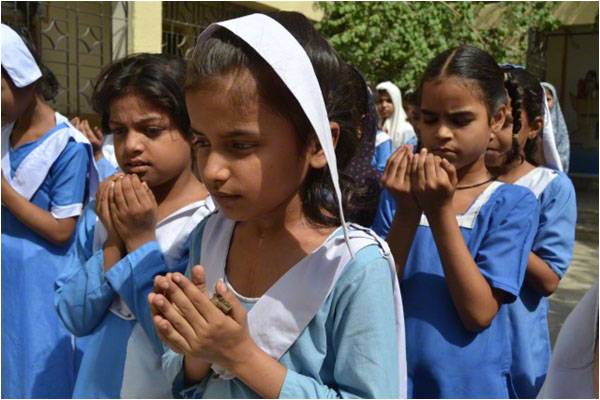
Six men armed with guns attacked a bus from the mostly-Ismaili Al Azhar Garden Colony in Karachi on Wednesday. Eyewitnesses say the attackers were on several motorcycles and donned police uniforms – a tactic used by terrorists to both create confusion and gain access. The gunmen first fired at the bus from outside, said a police source, and then entered the bus to attack the passengers. They used 9mm pistols and Kalashnikov rifles. Nearly 150 shell casings were recovered from the scene. In nearly 10 minutes of horrific violence, more than 40 people were killed and another 24 injured. Among the dead were 16 women and several children. Among the survivors was a little girl, who hid between the bodies.
Condemnations begin to pour in right away. Syed Qaim Ali Shah, chief minister of Sindh, wasted no time in suspending the local stationhouse officer and deputy superintendent of police. Bilawal Bhutto, Altaf Hussain and Imran Khan condemned the attack. Chief of the Army Staff Gen Raheel Sharif cancelled his trip to Sri Lanka. Condolences also came from across the border from Prime Minister Narendra Modi and Rahul Gandhi.
Around 1 pm, the Tehrik-e-Taliban Pakistan’s (TTP) Jundullah group, while talking to Reuters, claimed responsibility for the attack. A group with shifting allegiances, Jundullah was first affiliated with Al Qaeda, then the TTP, and even pledged loyalty to the Islamic State (IS) last year. The group has claimed responsibility for many prior attacks – In 2012, the Kohistan massacre, killing 18 Shia passengers on a bus; in 2013, eight foreign tourists and their guide in Gilgit-Baltistan; also in 2013, the twin bombing of the All-Saints Church in Peshawar that killed 127 and injured 250, the deadliest attack on the Christian community in Pakistan; in 2014, a suicide bomb attack at the closing ceremony at Wagah border, killing 60 and injuring well over a hundred; in 2015, a bomb on a Shia imambargah on January 30, which killed 61.
According to the Center for Research and Security Studies (CRSS) Quarterly Security Report for the first quarter of 2015, sectarian killings are on the rise in the country. Compared with the first quarter of 2014, this year saw a nearly 30% rise in sectarian violence, with casualties up from 278 to 384. The Shia community was the largest victim, accounting for nearly 60% of the casualties for the first quarter, followed by the Christian and Hindu communities. TTP-Jundullah claimed 184 of the sectarian casualties, thus accounting for 48% of the violence committed. By all accounts, sectarian violence has decreased in all regions of Pakistan except Balochistan, while the overall incidents of terrorism have reduced by about 18%, compared to the same quarter last year.
Since the Peshawar attack, overall incidents of terrorism in the country have dropped, but the focus of the violence has shifted towards minorities.
Wednesday’s executions of bus passengers in broad daylight, on a busy street, in one the largest cities of Pakistan, is a stark reminder of the terrifying access and penetration groups like TTP-Jundullah possess, the powerlessness of the law enforcement agencies to tackle this challenge, and the uphill battle to overcome the menace ahead.
Condemnations begin to pour in right away. Syed Qaim Ali Shah, chief minister of Sindh, wasted no time in suspending the local stationhouse officer and deputy superintendent of police. Bilawal Bhutto, Altaf Hussain and Imran Khan condemned the attack. Chief of the Army Staff Gen Raheel Sharif cancelled his trip to Sri Lanka. Condolences also came from across the border from Prime Minister Narendra Modi and Rahul Gandhi.
Around 1 pm, the Tehrik-e-Taliban Pakistan’s (TTP) Jundullah group, while talking to Reuters, claimed responsibility for the attack. A group with shifting allegiances, Jundullah was first affiliated with Al Qaeda, then the TTP, and even pledged loyalty to the Islamic State (IS) last year. The group has claimed responsibility for many prior attacks – In 2012, the Kohistan massacre, killing 18 Shia passengers on a bus; in 2013, eight foreign tourists and their guide in Gilgit-Baltistan; also in 2013, the twin bombing of the All-Saints Church in Peshawar that killed 127 and injured 250, the deadliest attack on the Christian community in Pakistan; in 2014, a suicide bomb attack at the closing ceremony at Wagah border, killing 60 and injuring well over a hundred; in 2015, a bomb on a Shia imambargah on January 30, which killed 61.
According to the Center for Research and Security Studies (CRSS) Quarterly Security Report for the first quarter of 2015, sectarian killings are on the rise in the country. Compared with the first quarter of 2014, this year saw a nearly 30% rise in sectarian violence, with casualties up from 278 to 384. The Shia community was the largest victim, accounting for nearly 60% of the casualties for the first quarter, followed by the Christian and Hindu communities. TTP-Jundullah claimed 184 of the sectarian casualties, thus accounting for 48% of the violence committed. By all accounts, sectarian violence has decreased in all regions of Pakistan except Balochistan, while the overall incidents of terrorism have reduced by about 18%, compared to the same quarter last year.
Since the Peshawar attack, overall incidents of terrorism in the country have dropped, but the focus of the violence has shifted towards minorities.
Wednesday’s executions of bus passengers in broad daylight, on a busy street, in one the largest cities of Pakistan, is a stark reminder of the terrifying access and penetration groups like TTP-Jundullah possess, the powerlessness of the law enforcement agencies to tackle this challenge, and the uphill battle to overcome the menace ahead.

